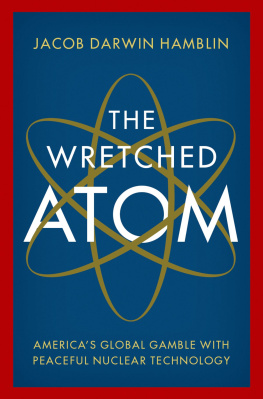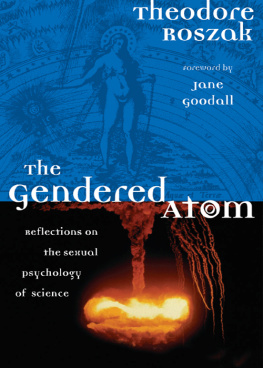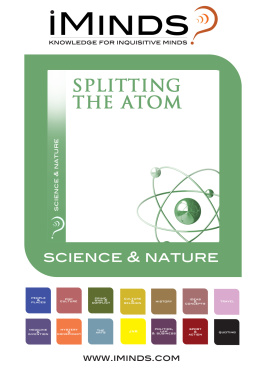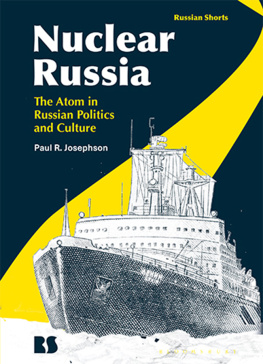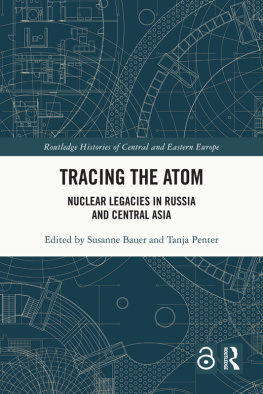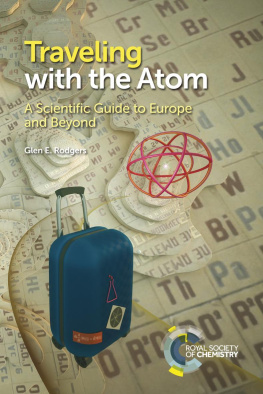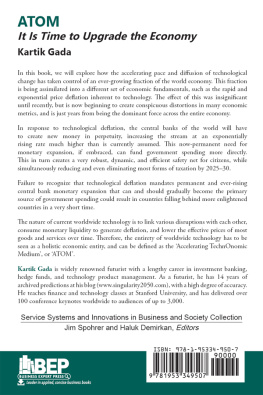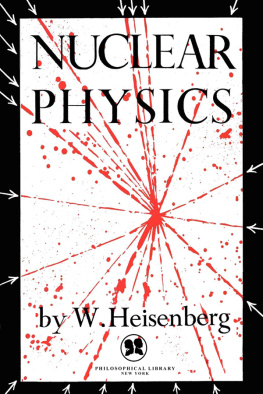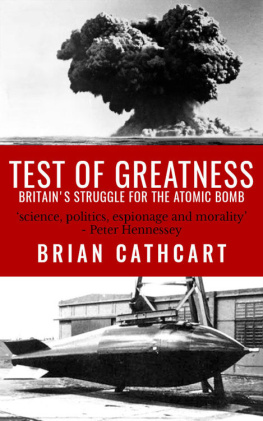The Wretched Atom

Oxford University Press is a department of the University of Oxford. It furthers the Universitys objective of excellence in research, scholarship, and education by publishing worldwide. Oxford is a registered trade mark of Oxford University Press in the UK and certain other countries.
Published in the United States of America by Oxford University Press
198 Madison Avenue, New York, NY 10016, United States of America.
Oxford University Press 2021
All rights reserved. No part of this publication may be reproduced, stored in a retrieval system, or transmitted, in any form or by any means, without the prior permission in writing of Oxford University Press, or as expressly permitted by law, by license, or under terms agreed with the appropriate reproduction rights organization. Inquiries concerning reproduction outside the scope of the above should be sent to the Rights Department, Oxford University Press, at the address above.
You must not circulate this work in any other form and you must impose this same condition on any acquirer.
Library of Congress Cataloging-in-Publication Data
Names: Hamblin, Jacob Darwin, author.
Title: The wretched atom : Americas global gamble with peaceful nuclear
technology / Jacob Darwin Hamblin.
Description: New York, NY : Oxford University Press, [2021] |
Includes index.
Identifiers: LCCN 2020039419 (print) | LCCN 2020039420 (ebook) |
ISBN 9780197526903 (hardback) | ISBN 9780197526927 (epub) | ISBN 9780197526934
Subjects: LCSH: Nuclear industryUnited StatesHistory20th century. |
Nuclear energyGovernment policyUnited States. | Nuclear energy
Economic aspectsUnited States. | Nuclear nonproliferation
International cooperation. | United StatesForeign relations
20th century. | United StatesForeign economic relations.
Classification: LCC HD9698.U52 H25 2021 (print) |
LCC HD9698.U52 (ebook) | DDC 338.4/762345119097309045dc23
LC record available at https://lccn.loc.gov/2020039419
LC ebook record available at https://lccn.loc.gov/2020039420
DOI: 10.1093/oso/9780197526903.001.0001
Dedicated to my sister
Sara Elizabeth Hamblin
Contents
This is my fourth book based on original research, and it is no easy task to identify all the people who should be thanked. I began thinking about international dimensions of science and technology as a PhD student in the 1990s, and I even considered writing a history of the International Atomic Energy Agency as a dissertation. Im glad I didnt. My PhD advisor, Lawrence Badash (19342010), didnt like the idea, and for good reason. The available archives were thin, the topic was vast, and besides, who wants to read an institutional history? I headed to other waters, choosing to write instead about oceanographers and the Cold War. Since that time, I have been helped in my work by scholars, students, archivists, and many others, as I have published on international cooperation in science, radioactive waste in the oceans, and the connections between military research and environmental science. Although the idea for this book came while I was looking through files at the archives of the Food and Agriculture Organization in Rome, I owe a debt to many others as I have researched and thought about these issues over the past two decades.
Some specific thanks are in order. Oxford University Press editor Susan Ferber has been a patient listener, and I continue to be awed by her capacity to read carefully and thoughtfully on such a wide range of subjects. The faculty and students at my home institution, Oregon State University, continuously shape my views about the past. Several scholars have been generous with feedback or other assistance over the years of researching, thinking about, and writing aspects of this book. They include Lisa Brady, Kate Brown, Angela Creager, John DiMoia, Toshihiro Higuchi, Paul Josephson, David Kaiser, Stuart W. Leslie, Gisela Mateos, Patrick McCray, Erika Milam, Ingrid Ockert, Jahnavi Phalkey, Maria Rentetzi, Linda Richards, Asif Siddiqi, Edna Surez-Daz, Aaron T. Wolf, Masakatsu Yamazaki, and Karin Zachmann. I especially wish to acknowledge Christine Keiner, Jayita Sarkar, Robynne Mellor, and Jonathan Hunt for circulating drafts of their own manuscripts to me, prior to their publication.
I would like to thank the archivists and staff at all the institutions I consulted. I especially wish to thank those at the Food and Agriculture Organization (Rome) and the International Atomic Energy Agency (Vienna). At the IAEA, I was told that I was the first historian to use their archive for serious historical research. I remember my first 2008 visit to Vienna well; they did not quite know where to put me, so they cleared off someones desk. The amount of material they released was sparse, even for documents more than forty years old. In 2014 I wrote an essay in The Conversation that criticized the agency for finding excuses to keep embarrassing material from the public eye. When I returned in 2016, the archivists were more experienced in receiving scholars and had been working to open up more. There is a long way to go for the agency as a whole, but I appreciate individual efforts to act in good faith within the wheels of bureaucracy.
Special thanks go to my family: my wife Sara and my children Sophia and Harper. I write these words several months into the COVID-19 pandemic, when we are confined together in strange circumstances. It is a reminder of how much patience and support are required from loved ones when a writer is trying to finish a book about one thing while worrying about so much else. My network of support includes my in-laws Paul and Cathy Goldberg, who amaze me in their capacity to provide encouragement. I especially want to thank my first familymy parents Les and Sharon Hamblin and my sister Sara. My fathers long career in the Air Force working in strategic analysis and nuclear missiles shaped all our lives as we moved constantly from one place to another, and clearly influenced my own interests. I have admired my fathers willingness to think critically and historically, just as I have appreciated my mothers wit, tenacity, and humility. As I have aged and seen my own children grow, I am reminded of how important those first relationships were to me. I also see how formative our own siblings are in the ways we see the world. Surely my life, my ideas, and my writing would be dramatically different without my sister, my first companion and friend. This book is dedicated to her.
The Wretched Atom
Ansari was mildly apprehensive that Iran would not be able to acquire the technical know-how to build facilities to fabricate fuel for the reactors. During the previous summer, India had detonated a fission device, sparking worldwide outcry that nuclear weapons capability had spread to yet another
Earlier that morning, Kissinger had a different sort of meeting with the president. I dont think they realize what they are doing, Kissinger crowed, referring to the Iranian stuff. The most important issue was not proliferation, but petroleum. Soon the Iranians would have so many financial commitments that they would lose their ability to cut oil production. We may have broken OPEC, or will have if we can make one more deal like this.
By the time of the 1975 discussions with Iran, the United States had three decades of experience incorporating civilian nuclear technology into its relations with other countries. Atomic energyto use the phrase most widely used at the timehad powerful appeal and seemed destined to lift up the poorest people on earth and deliver a future of abundance. Electricity generation was supposed to become too cheap to meter, as one American political operator, Lewis Strauss, predicted in the 1950s.

